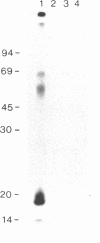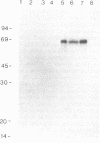Abstract
We have generated a mouse monoclonal antibody (H23) against the retrovirus-like particles (human mammary tumor virus) released in vitro by the human breast adenocarcinoma cell line T47D. This antibody reacts specifically with a glycoprotein with an apparent molecular mass of 68 kDa (gp68) that is detected in the growth medium of T47D cells as well as in pleural effusion fluids from breast adenocarcinoma patients. No detectable levels of this antigen could be observed in pleural effusions of patients with cancers other than of breast origin. The H23-related antigen was localized in the cytoplasm of breast tumor cells as well as on the cell surface of both T47D cells and metastatic cells from breast cancer patients. A survey of tissue from 812 patients was performed by using H23 in an indirect immunoperoxidase assay. The results showed that the antigen was detectable in 91% of all breast tumors tested. No cytoplasmic staining was observed in either normal tissues or nonbreast carcinomas. Only one of the benign breast tissues tested (out of a total of 56 samples of tissue) was positive for this antigen. Given the ability of this antibody to specifically detect breast tumor cells, H23 may be of importance in diagnosis and in clinical follow-up of patients for the detection of metastatic lesions by imaging and for therapy.
Full text
PDF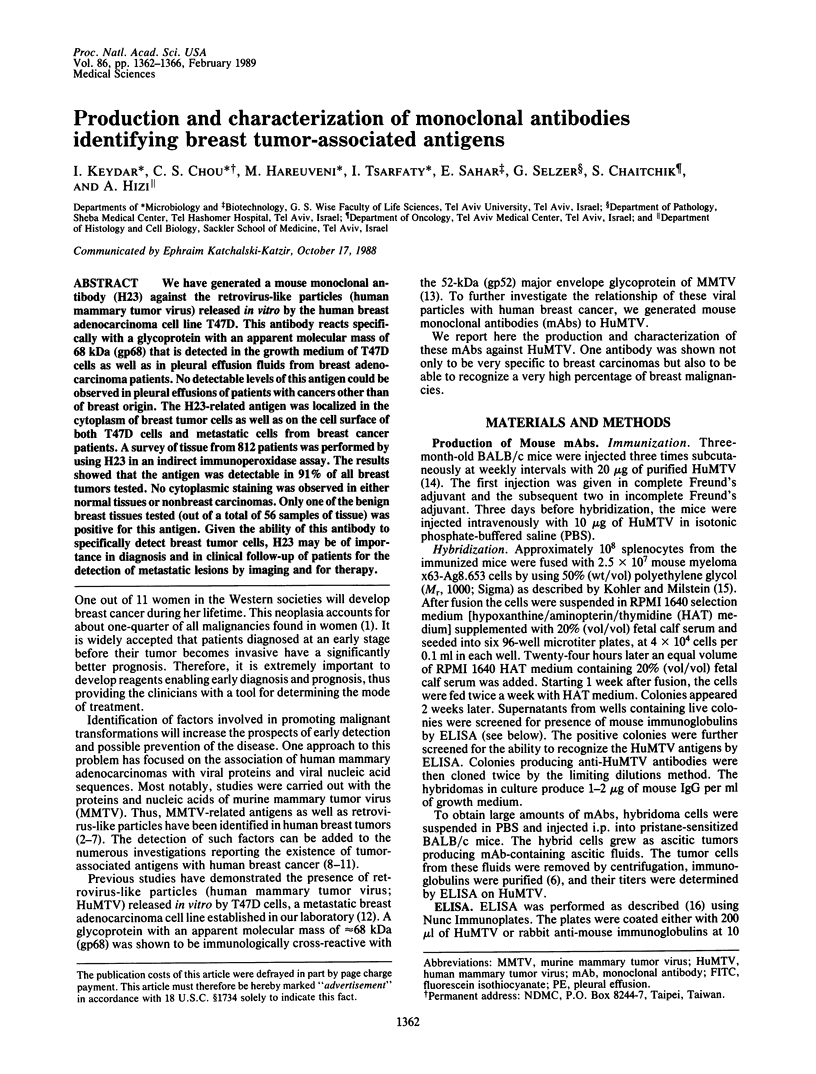
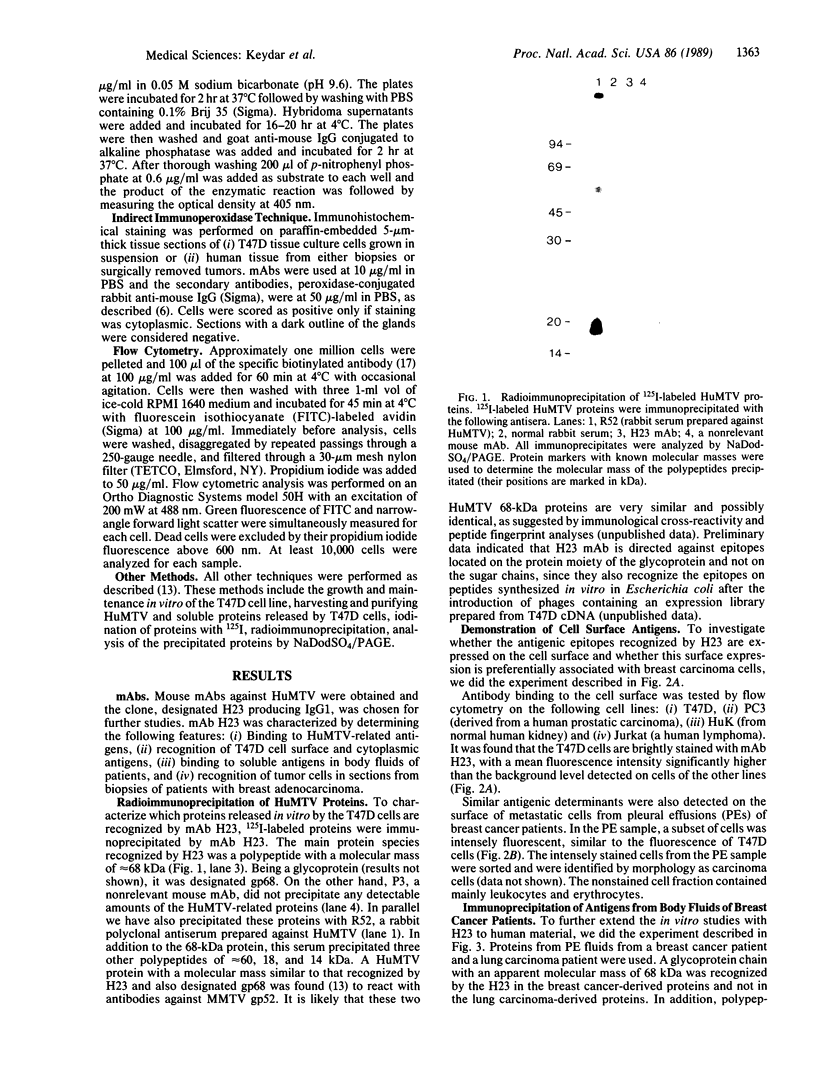
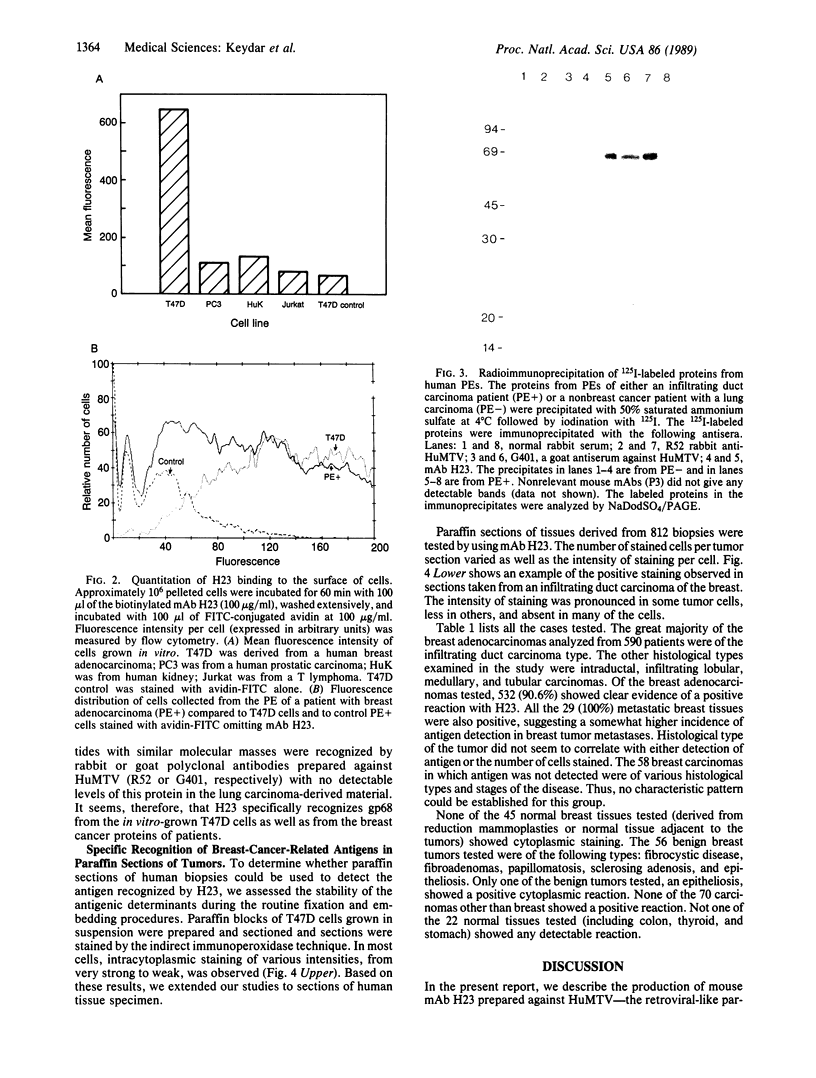
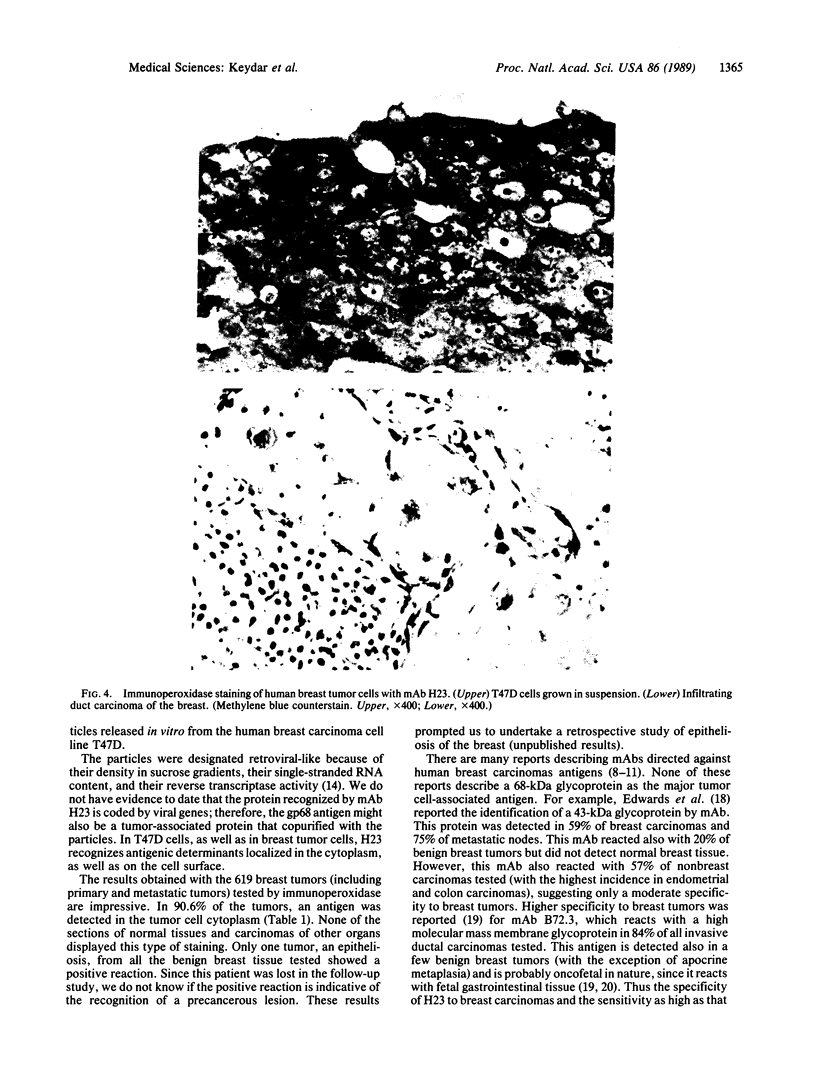
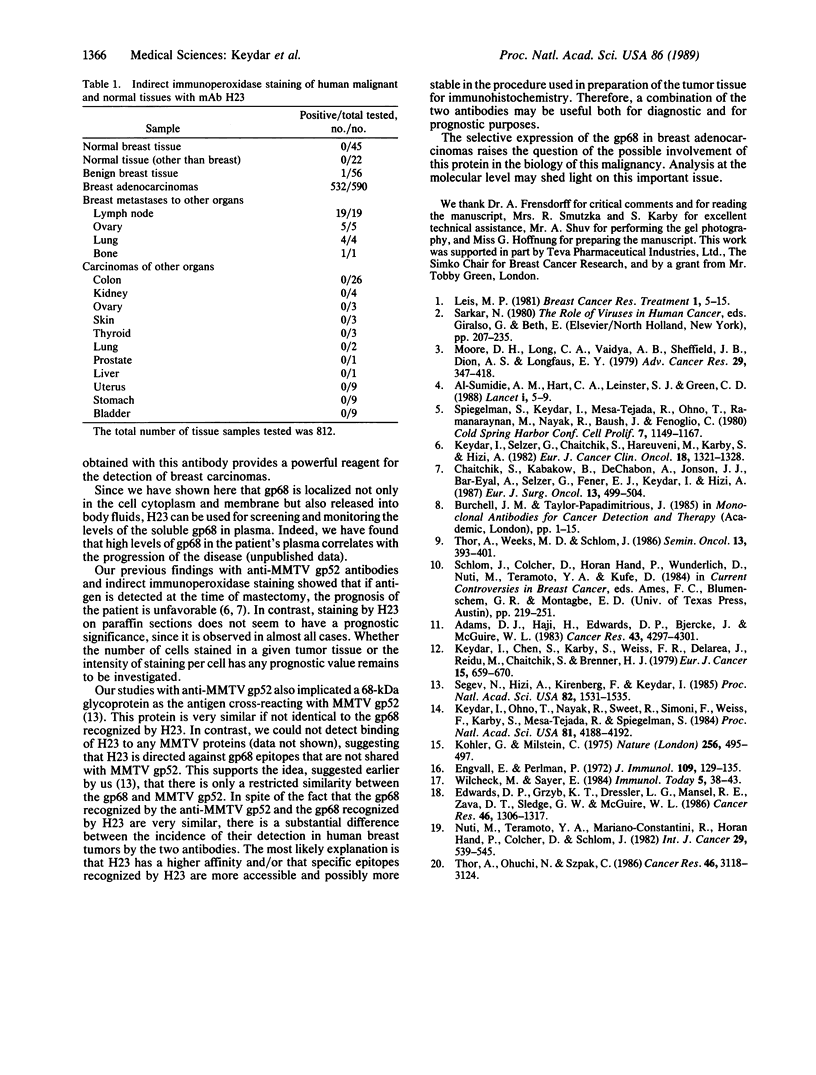
Images in this article
Selected References
These references are in PubMed. This may not be the complete list of references from this article.
- Adams D. J., Hajj H., Edwards D. P., Bjercke R. J., McGuire W. L. Detection of a Mr 24,000 estrogen-regulated protein in human breast cancer by monoclonal antibodies. Cancer Res. 1983 Sep;43(9):4297–4301. [PubMed] [Google Scholar]
- Al-Sumidaie A. M., Leinster S. J., Hart C. A., Green C. D., McCarthy K. Particles with properties of retroviruses in monocytes from patients with breast cancer. Lancet. 1988 Jan 2;1(8575-6):5–9. doi: 10.1016/s0140-6736(88)90998-1. [DOI] [PubMed] [Google Scholar]
- Chaitchik S., Kabakow B., De Chabon A., Jonson J. J., Bar-Eyal A., Selzer G., Feuer E. J., Keydar I., Hizi A. Prognostic factors in breast cancer--a pathological and immunological study of patients with stage 1 breast cancer. Eur J Surg Oncol. 1987 Dec;13(6):499–504. [PubMed] [Google Scholar]
- Edwards D. P., Grzyb K. T., Dressler L. G., Mansel R. E., Zava D. T., Sledge G. W., Jr, McGuire W. L. Monoclonal antibody identification and characterization of a Mr 43,000 membrane glycoprotein associated with human breast cancer. Cancer Res. 1986 Mar;46(3):1306–1317. [PubMed] [Google Scholar]
- Engvall E., Perlmann P. Enzyme-linked immunosorbent assay, Elisa. 3. Quantitation of specific antibodies by enzyme-labeled anti-immunoglobulin in antigen-coated tubes. J Immunol. 1972 Jul;109(1):129–135. [PubMed] [Google Scholar]
- Keydar I., Chen L., Karby S., Weiss F. R., Delarea J., Radu M., Chaitcik S., Brenner H. J. Establishment and characterization of a cell line of human breast carcinoma origin. Eur J Cancer. 1979 May;15(5):659–670. doi: 10.1016/0014-2964(79)90139-7. [DOI] [PubMed] [Google Scholar]
- Keydar I., Ohno T., Nayak R., Sweet R., Simoni F., Weiss F., Karby S., Mesa-Tejada R., Spiegelman S. Properties of retrovirus-like particles produced by a human breast carcinoma cell line: immunological relationship with mouse mammary tumor virus proteins. Proc Natl Acad Sci U S A. 1984 Jul;81(13):4188–4192. doi: 10.1073/pnas.81.13.4188. [DOI] [PMC free article] [PubMed] [Google Scholar]
- Keydar I., Selzer G., Chaitchik S., Hareuveni M., Karby S., Hizi A. A viral antigen as a marker for the prognosis of human breast cancer. Eur J Cancer Clin Oncol. 1982 Dec;18(12):1321–1328. doi: 10.1016/0277-5379(82)90136-5. [DOI] [PubMed] [Google Scholar]
- Köhler G., Milstein C. Continuous cultures of fused cells secreting antibody of predefined specificity. Nature. 1975 Aug 7;256(5517):495–497. doi: 10.1038/256495a0. [DOI] [PubMed] [Google Scholar]
- Leis H. P., Jr The surgeon's role in breast cancer: changing concepts. Breast Cancer Res Treat. 1981;1(1):5–15. doi: 10.1007/BF01807886. [DOI] [PubMed] [Google Scholar]
- Moore D. H., Long C. A., Vaidya A. B., Sheffield J. B., Dion A. S., Lasfargues E. Y. Mammary tumor viruses. Adv Cancer Res. 1979;29:347–418. doi: 10.1016/s0065-230x(08)60850-7. [DOI] [PubMed] [Google Scholar]
- Nuti M., Teramoto Y. A., Mariani-Costantini R., Hand P. H., Colcher D., Schlom J. A monoclonal antibody (B72.3) defines patterns of distribution of a novel tumor-associated antigen in human mammary carcinoma cell populations. Int J Cancer. 1982 May 15;29(5):539–545. doi: 10.1002/ijc.2910290509. [DOI] [PubMed] [Google Scholar]
- Segev N., Hizi A., Kirenberg F., Keydar I. Characterization of a protein, released by the T47D cell line, immunologically related to the major envelope protein of mouse mammary tumor virus. Proc Natl Acad Sci U S A. 1985 Mar;82(5):1531–1535. doi: 10.1073/pnas.82.5.1531. [DOI] [PMC free article] [PubMed] [Google Scholar]
- Thor A., Ohuchi N., Szpak C. A., Johnston W. W., Schlom J. Distribution of oncofetal antigen tumor-associated glycoprotein-72 defined by monoclonal antibody B72.3. Cancer Res. 1986 Jun;46(6):3118–3124. [PubMed] [Google Scholar]
- Thor A., Weeks M. O., Schlom J. Monoclonal antibodies and breast cancer. Semin Oncol. 1986 Dec;13(4):393–401. [PubMed] [Google Scholar]



